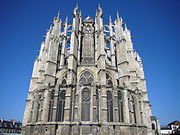Oise
| Oise | ||
|---|---|---|
| Department | ||
|
Prefecture building of the Oise department, in Beauvais | ||
| ||
 Location of Oise in France | ||
| Coordinates: 49°23′N 02°25′E / 49.383°N 2.417°ECoordinates: 49°23′N 02°25′E / 49.383°N 2.417°E | ||
| Country | France | |
| Region | Picardy | |
| Prefecture | Beauvais | |
| Subprefectures |
Clermont Compiègne Senlis | |
| Government | ||
| • President of the General Council | Yves Rome | |
| Area1 | ||
| • Total | 5,860 km2 (2,260 sq mi) | |
| Population (2007) | ||
| • Total | 816,142 | |
| • Rank | 25th | |
| • Density | 140/km2 (360/sq mi) | |
| Time zone | CET (UTC+1) | |
| • Summer (DST) | CEST (UTC+2) | |
| Department number | 60 | |
| Arrondissements | 4 | |
| Cantons | 41 | |
| Communes | 693 | |
| ^1 French Land Register data, which exclude estuaries, and lakes, ponds, and glaciers larger than 1 km2 | ||
Oise (French pronunciation: [waz]) is a department in the north of France. It is named after the river Oise.
History
Oise is one of the original 83 departments created during the French Revolution on March 4, 1790. It was created from part of the province of Île-de-France and Picardy.
After the coalition victory at Waterloo, the department was occupied by British troops between June 1815 and November 1818.
Geography
Oise is part of the current region of Picardy and is situated 35 km north of Paris. It is surrounded by the departments of Somme, Aisne, Seine-et-Marne, Val-d'Oise, Eure, and Seine-Maritime.
Population
Natives of the department are called Isariens.
Tourism
The major tourist attraction of the department is the Parc Astérix, which opened in 1989. Another very interesting site is Beauvais Cathedral. Also to be seen is the Chateau de Pierrefonds, restored by Viollet-le-Duc. The art collection of the Château de Chantilly is one of the largest outside Paris.
-
Art gallery in the Château de Chantilly
-

Rollercoaster at the Parc Astérix
-

Renault FT in the Glade of the Armistice
Twinned county
Oise is twinned with Bedfordshire. One of the villages along the river Oise is Auvers-sur-Oise, famous for having been visited by several impressionist artists. This is where Vincent van Gogh spent his last 70 days and it is his and his brother Theo's resting place.
See also
- Arrondissements of the Oise department
- Cantons of the Oise department
- Communes of the Oise department
- Monument aux morts (Oise)
External links
- (French) Prefecture website
- (French) General Council website
- (French) oise directory website
- (English) Oise Tourist Board




